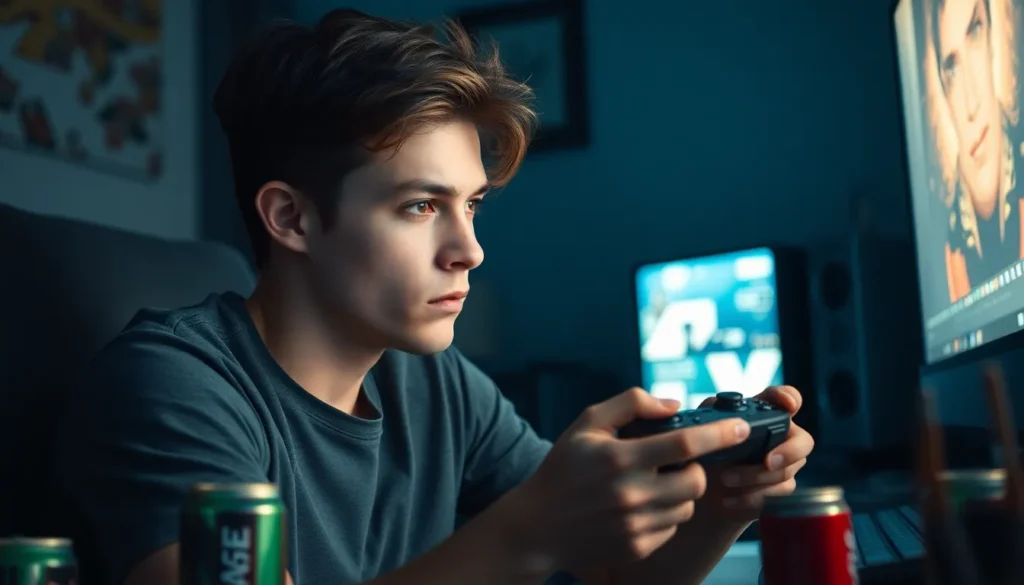In a world where gaming can transport players to fantastical realms, it’s easy to lose track of time—or sanity. Many dive deep into their favorite games, battling dragons or solving mysteries, but what happens when the fun turns into a frenzy? Excessive gaming may lead to a surprising side effect: anxiety.
Picture this: you’ve just spent hours leveling up your character, only to realize you’ve forgotten to eat, sleep, or even check if the sun’s still shining. The thrill of the game can quickly morph into a source of stress. As players find themselves caught in a whirlwind of quests and challenges, the question arises: can too much gaming really crank up the anxiety levels? Let’s explore this digital dilemma and find out if it’s time to hit pause on those epic adventures.
Table of Contents
ToggleUnderstanding Overdertoza in Gaming
Overdertoza refers to the phenomenon where excessive gaming disrupts daily life and health. Players often experience diminished control over their gaming habits. Such patterns can lead to neglect of essential activities like eating and sleeping, increasing stress levels.
In gaming, immersion can be intense. The escapism that games provide can cause individuals to lose track of time. This disconnection from reality can contribute to feelings of anxiety when they eventually face their responsibilities. Symptoms of overdertoza might include irritability, restlessness, or depression as players struggle to balance gaming with real-life obligations.
Physical health also suffers due to overdertoza. Long gaming sessions often result in a sedentary lifestyle, leading to fatigue and lack of energy. Poor posture while gaming increases the risk of physical discomfort. Consequently, this discomfort can add to the overall anxiety, creating a cycle that is hard to break.
Understanding the psychological aspects of overdertoza is vital. Players frequently use gaming as a coping mechanism, but when it becomes excessive, it can exacerbate underlying issues. Recognizing when gaming becomes counterproductive is essential for maintaining mental well-being.
Encouragement to seek a balanced approach to gaming is important. Players must consider establishing limits on screen time. Establishing such boundaries fosters a healthier relationship with gaming and significantly reduces anxiety levels. Emphasizing moderation can promote enjoyment and connection with the gaming community, rather than leading to isolation and stress.
The Link Between Gaming and Anxiety

Gaming can significantly impact an individual’s mental and physical health. Understanding these effects clarifies why excessive gaming is a concern.
Psychological Effects of Excessive Gaming
Excessive gaming often leads to feelings of anxiety and stress. Players may find themselves overwhelmed by game-related challenges, which can spill over into real life. Constantly striving for high scores can also create pressure, contributing to increased irritability. Disconnecting from reality becomes common when individuals immerse themselves in virtual worlds for long periods. Players may neglect their responsibilities and relationships, fueling feelings of isolation and anxiety. Increased screen time often correlates with heightened emotional distress, highlighting the need to monitor gaming habits. Negative emotions can manifest in various ways, including irritability and restlessness, complicating one’s overall mental health.
Physical Health Consequences
Physical health suffers as gaming time increases. Sedentary behavior is a direct outcome of prolonged gaming sessions, leading to weight gain and decreased fitness. Poor posture during marathon gaming sessions can cause long-term discomfort and pain. Fatigue often sets in when individuals ignore basic needs like sleep and hydration due to extensive gaming. Lack of physical activity can exacerbate anxiety, creating a vicious cycle that’s hard to break. Symptoms of physical neglect, such as eye strain and headaches, frequently emerge, impacting daily functions. Awareness of these health effects encourages a reevaluation of gaming practices, promoting moderation for overall well-being.
Signs of Anxiety Related to Gaming
Excessive gaming can present several signs of anxiety. Recognizing these signs early helps in addressing the related issues effectively.
Behavioral Indicators
Changes in behavior often signal anxiety linked to gaming. Increased irritability frequently occurs when game results don’t meet expectations. Players may experience restlessness during or after gaming sessions. Withdrawal from social interactions outside of gaming often develops, indicating a shift in priorities. Disorganization in daily tasks also becomes evident as gaming takes precedence over responsibilities. Neglecting hygiene or meal times can further illustrate the impact of overdertoza on a player’s life.
Emotional Symptoms
Emotional symptoms reveal how gaming affects mental health. Many gamers experience heightened feelings of sadness or mood swings. Increased frustration can arise when facing challenges within games, contributing to anxiety. Fear of losing progress or status in a game intensifies emotional distress. Isolation from friends and family often promotes feelings of loneliness. Difficulty concentrating or making decisions outside of gaming may also develop, reflecting the struggle to balance reality and virtual experiences.
Strategies to Mitigate Anxiety from Gaming
Managing anxiety from excessive gaming involves active steps to create a healthier gaming environment. Establishing a mindful gaming routine promotes balance and reduces stress.
Setting Healthy Gaming Limits
Setting time constraints on gaming ensures players maintain a balanced lifestyle. Gamers can choose specific hours dedicated to gaming, fostering accountability. Breaking gaming sessions into manageable chunks helps prevent overindulgence. Scheduling regular breaks during play allows time for physical activity and social interactions. Tracking time spent on games can illuminate gaming habits, making it easier to adjust them. Utilizing apps that remind players to take breaks prevents prolonging play beyond healthy limits.
Seeking Professional Help
Seeking help from mental health professionals can provide crucial support for gamers feeling overwhelmed. Therapists can offer strategies tailored to individual needs, helping to address underlying anxiety issues. Support groups provide a platform for sharing experiences with others facing similar challenges. Engaging in therapy can aid in developing coping mechanisms to handle stress related to gaming. Guidance from experts can significantly improve overall mental well-being, facilitating healthier gaming practices. Taking the step to seek assistance reinforces the importance of mental health in the gaming community.
Excessive gaming can significantly impact mental health and contribute to anxiety. Players often find themselves caught in a cycle of neglecting essential aspects of life in favor of virtual worlds. This disconnection from reality can lead to feelings of stress and overwhelm.
Recognizing the signs of overdertoza is crucial for maintaining a healthy balance. By setting limits and prioritizing real-life responsibilities, gamers can enjoy their favorite pastime without compromising their well-being. Seeking professional help when needed can provide valuable support and strategies for managing anxiety.
Ultimately, fostering a healthier relationship with gaming is essential for both enjoyment and mental health.





